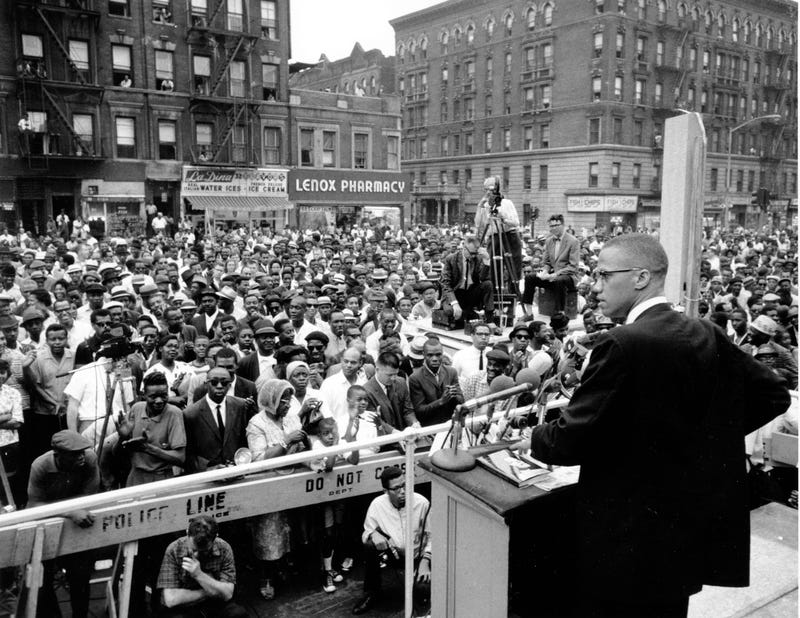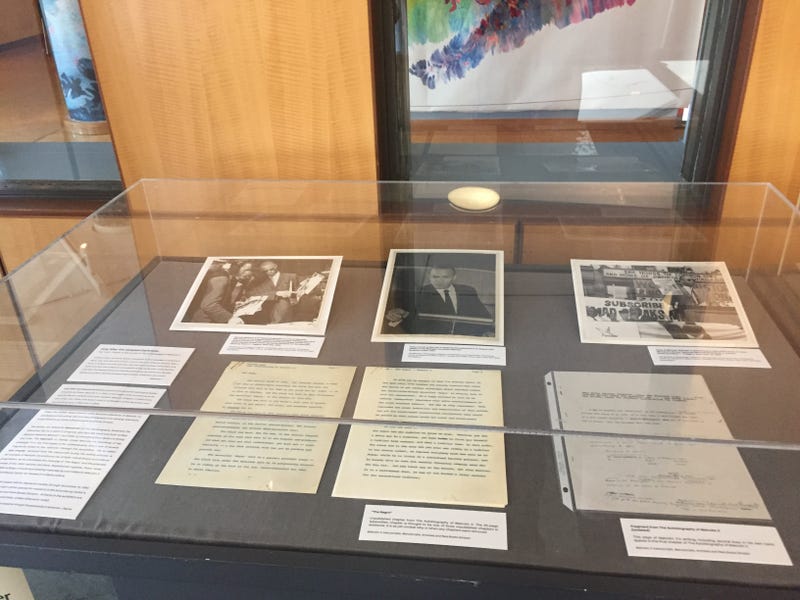http://www.blackagendareport.com/index. ... 7&Itemid=1
The Day the Music Died: Malcolm X's Assassination
Wednesday, 25 February 2009
by Roland Sheppard
"When I looked up, I saw Malcolm X standing up and glaring down at
one of his assassins. At that point, from the corner of my eye,
nearby to my left, I saw a flash from a gun as I watched Malcolm X
fall down and back about ten feet."
An earlier edited version of this article appeared in the San
Francisco BayView National Black Newspaper.
"It was the saddest day of my life."
In the afternoon, on January 21, 1965, I went to the Audubon Ballroom
to hear Malcolm X speak. I also went to sell the newspaper, The
Militant, a radical newspaper, which at that time, printed the truth
about Malcolm X, his speeches, and publicly defended him.
When I got to the Ballroom, things were radically different -- there
were no cops. (Normally Malcolm's meetings in Harlem were crawling
with cops.) As I was selling papers, Malcolm X approached the Audubon
Ballroom, I offered to sell him the latest issue, but he told
me, "not today Roland, I am alone and in a hurry."
A while later, as I entered the meeting room I again did not see any
cops. I went in to sit down, where I normally sat along with the rest
of the press in the front and the left side of the room. On the way
to my seat, Gene Roberts, who later surfaced as a police agent member
of the Black Panther Party, told me that I could not sit at my
regular place, but on that day I had to sit in the front row on the
right side of the hall, facing the stage.
As I sat down, I glanced over, to where I normally sat, and saw a
large Black man, with a Navy Blue-gray trench coat. When the meeting
started all was quiet, as the crowd listened to Benjamin X
introducing Malcolm X.
When Malcolm approached the podium, he gave the normal Muslim
greeting for peace, at that point a disturbance occurred in the room.
Two men were standing about halfway back in the room and to the right
of the Malcolm on stage. One was shouting "Get your hand out of my
pocket." Malcolm was trying to calm things down, when the men, one
later identified as Talmadge Hayer, started running down the aisle
shouting and firing a pistol at Malcolm and ran out the exit doors by
the stage, to the right of Malcolm X.
"I saw a flash from a gun as I watched Malcolm X fall down and back
about ten feet."
Suddenly I heard gunshots fired from all over the place, and I
instinctively hit the floor. When I looked up, I saw Malcolm X
standing up and glaring down at one of his assassins. At that point,
from the corner of my eye, nearby to my left, I saw a flash from a
gun as I watched Malcolm X fall down and back about ten feet. In that
instant, when Malcolm died before my eyes, I suddenly realized how
big he was and I realized that he was a giant in stature, in the
world. This vision of Malcolm X, being assassinated, has haunted me
till this day. (The fatal blast, which I later found out to be from a
shotgun, came from the area where I had seen the large Black man,
with a Navy Blue-gray trench coat!)
When I left the hall, Malcolm's bodyguards told me that they had
caught two of the assassins, one who was shot (Talmadge Hayer) and
one whom the police took away.
A few weeks later, when I was questioned in the Harlem Police
station, I was shown a series of photos of people whom I recognized
as members of the Nation of Islam or Malcolm's organization. I also
saw a picture of the large Black man, with a Navy Blue-gray trench
coat, that I had seen at the Audubon Ballroom. I was thinking of how
to respond to the cops and how to say that I did not recognize the
photos of Malcolm's friends and supporters and the members of the
Nation of Islam.
I then told the cops that I had to go to the rest room. When I got to
the men's room door, I saw the same large Black man, coming out of
the men's room, that I had seen in the Audubon Ballroom and in the
photos that were just shown to me. Then he walked by me, he walked
past the desks of the secretary pool, and went to his office inside
the police station! At that point I knew that he and the government
either killed Malcolm X or were part of the assassination plot. I
became very nervous thinking about what I was going to say to the
cops when I got back and how I was going to get out of the station
alive. I then came up with, "I can not recognize anyone, for all
Black people look the same." The cops nodded in agreement and I was
then allowed to leave the police station.
"At that point I knew that he and the government either killed
Malcolm X or were part of the assassination plot."
Malcolm X was my one of my heroes. He was the most honest mass leader
that I have ever known or seen. He was a great orator and his
speeches seemed like a conversation between himself and the audience.
His speeches were like music to my ear and have inspired me for the
rest of my life in the fight for social justice.
He was so human in his orations, I still remember him when made the
Harlem 'Hate Gang' Scare speech at The Militant Labor Forum, on May
29, 1964 and other speeches when he chuckled a 'heh heh' when he was
about to make a special comment. At that Forum he said: "It's
impossible for a chicken to produce a duck egg... The system of this
country cannot produce freedom for an Afro-American. It is impossible
for this system, this economic system, this political system, this
social system, this system period. It is impossible for it , as it
now stands, to produce freedom right now for the Black man in this
country - it is impossible. And if ever a chicken did produce a duck
egg, (heh heh) I'm certain you would say it was certainly a
revolutionary chicken. (heh heh)"
Both he and Martin Luther King had come to similar positions about
capitalism and the Vietnam War at the time of their death. That is
why this government assassinated them. No one has followed in their
footsteps. From the point of view of this government, the world
leader in political assassinations, the two assassinations worked.
For to this day, no mass leader has had the courage to pick up where
they left off. They were able to silence the art, science, and
truth, of these two great orators. To me, February 21st is "The day
the Music Died." It was the saddest day of my life.
Roland Sheppard is a writer and activist and former BA of the
Painters Union in San Francisco. Visit his website,
http://web.mac.com/rolandgarret.






